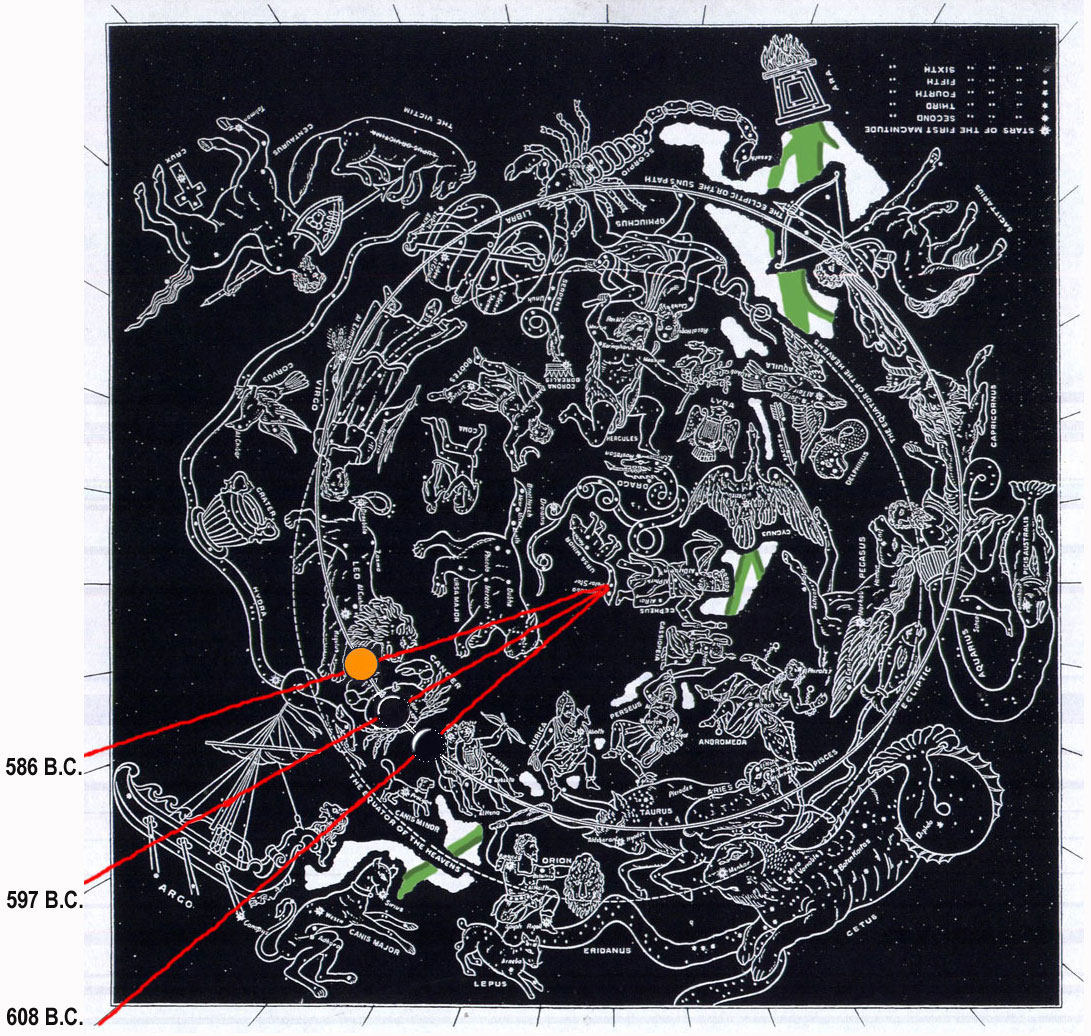

Ezekiel Chapter 19 Star Chart: Clockwise from when Jehoahaz (Argo's Lion) was taken captive to Egypt in 608 B.C. as the first young lion till Jehoiachin (Ursa Major is Leo Minor) was taken captive to Babylon in 597 B.C. as the second young lion till Zedekiah (Leo) was taken captive to Babylon in 586 B.C. as the third young lion is 22° years from Argo to Leo. Notice the lunar pits and red radius line net and chains. Jehoahaz, son of Josiah, was carried to Egypt by Pharaoh Necho after the defeat of his father at Megiddo (2 Kings 23:31-35; see also Jeremiah 22:10-12). He also bore the name of Shallum. Coming to the throne at the age of 23 he reigned only 3 months, and died in Egypt (Jeremiah 5:26). A fire also has gone out from one of her strong rods which has consumed her. Her last princely young lion, Zedekiah, (Leo), finally broken the state to pieces in 586 B.C. Jehoahaz his son reigned three months. Jehoiakim (son of Josiah), 608–597. Jehoiachin (his son) reigned 3 months. Zedekiah (son of Josiah), 597–586. Nebuchadnezzar besieges Jerusalem, 588. Fall of Jerusalem, 586
|
|---|
19:1 Moreover take thou up a lamentation for the (Gemini) princes of Israel, 2 And say, What is thy mother (Judah)? A (Leo) lioness: she lay down among (Leo Minor and Argo) lions, she nourished her whelps among young lions. 3 And she brought up one of her whelps: it became a (Argo) young lion, and it learned to catch the prey; it devoured (Gemini) men. 4 The nations also heard of him; he was taken in their (lunar black) pit, and they brought him with (red radius line) chains unto the land of Egypt. 5 Now when she saw that she had waited, and her hope was lost, then she took another of her (Leo Minor is Ursa Major) whelps, and made him a young lion. 6 And he went up and down (as the Zodiac rotated) among the lions, he became a young lion, and learned to catch the prey, and devoured (Gemini) men. 7 And he knew their desolate palaces, and he laid waste their cities; and the land was desolate, and the fulness thereof, by the noise of his roaring. 8 Then the nations set against him on every side from the provinces, and spread their (red radius line) net over him: he was taken in their (lunar black) pit. The nations - are here the Chaldaeans: 9 And they put him in ward in (red radius line) chains, and brought him to the king of Babylon: they brought him into holds, that his voice should no more be heard upon the mountains of Israel. Ezekiel 19:5-9. When she saw that she had waited — This seems to signify that the Jews waited some time before they thought of setting another king over them, hoping, probably, that the king of Egypt would restore unto them Jehoahaz, whom he had taken prisoner; but when they saw their hopes disappointed in this, and that there was no longer any room to expect it, then they, by the consent, and probably, direction of the king of Egypt, elected Jehoahaz’s brother, Eliakim, king in his stead, his name being changed to Jehoiakim. And he went up and down among the lions — He imitated the kings his neighbours, and became rapacious and cruel like them. And learned to catch the prey, &c. — He learned and practised all the methods of tyranny and oppression. And he knew their desolate palaces — Dr. Waterland and Houbigant render it, He destroyed their palaces; and Bishop Newcome, He brought evil upon their palaces. The meaning seems to be, that Jehoiakim made himself master of the riches and pleasant seats of the great men of the land. And the land was desolate, &c., by the noise of his roaring — His cruelty and oppression caused many of the inhabitants of Judea to remove out of it, and go and settle in other places, where they could live more secure. Then the nations set themselves against him, &c. — He was attacked by the Chaldeans, Syrians, Moabites, and Ammonites, and at last the king of Babylon took him prisoner, and carried him in fetters to Babylon: see 2 Chronicles 36:6. That his voice should no more be heard, &c. — That he should be no more a terror to the land of Israel. For Jehoiakim being compared, in the foregoing verses, to a lion, whose voice, or roaring, strikes men with terror; by saying that his voice should no more be heard, is signified that he should be no longer a terror to any in the country. 10 Thy mother is like a (red radius line) vine in thy blood, planted by the waters: she was fruitful and full of branches by reason of many waters. 11 And she had strong (red radius) rods for the sceptres of them that bare rule, and her stature was exalted among the thick branches, and she appeared in her height with the multitude of her branches. 12 But she was plucked up in fury, she was cast down to the ground, and the east wind dried up her fruit: her strong rods were broken and withered; the (solar) fire consumed them. This is a dirge; and therefore that which is foreseen by the prophet, the capture and burning of Jerusalem, is described as already accomplished. 13 And now she is planted in the wilderness, in a dry and thirsty ground. 14 And (solar) fire is gone out of a (red radius) rod of her branches, which hath devoured her fruit, so that she hath no strong rod to be a sceptre to rule. This is a lamentation, and shall be for a lamentation. Fire is gone out - Compare the marginal reference. Zedekiah is regarded, like Abimelech, as all usurper and the ruin of his people. |